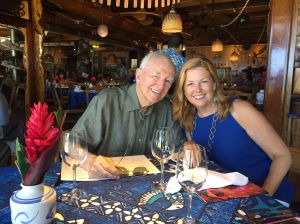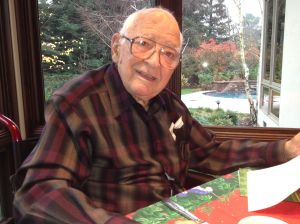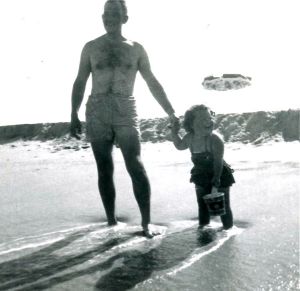The PICC line kept bothering him. That was what prompted me to move a chair right next to my father-in-law’s bed in the ICU. Relieving my husband after the long hospital night, I hoped to reassure Ray, to keep him from fiddling with the port that gave nurses immediate access to a vein just above his left elbow. He was tired, finally, but couldn’t quite settle.
The night before he’d been in rare form. When the night nurse asked him how he wanted to fill in the field on the white board for “what should you know about me,” he answered, “I am very attractive to women.” She wrote, “I am very attractive and funny.” He should have been exhausted after the heart attack that brought him in. Instead, he’d been euphoric, joyful, perhaps, to be on the other side of the pain that had seemed an insurmountable wall.
“4512,” he said. Then, “4512 McDonald Drive.”
The house where my husband and I lived while our house was being built. We rented it from my mother-in-law, whose mother still lived there when we were first engaged. My memories of it have gone syrupy. Nights walking my infant daughter from room to room, trying to soothe her, humming lullabies, willing her to sleep, desperate for it myself.
“Do you live there,” Ray asked.
“No,” I answered. “We haven’t lived there for a long time.”
I gave simple answers, hoping to satisfy him so he could rest.
“Who owns it now?”
I didn’t know and told him that my brother-in-law and his wife moved in after we left, but they hadn’t lived there in a long time either.
On his forehead, a thin white scar, shaped like an upside down Y, nested in the V that emerged between his eyebrows. He was worrying.
The pillows I’d tucked behind his back helped him maintain his position on his side but discomfort still needled him after too many hours in the hospital bed. He pulled himself toward the rail. With my left hand, I stroked the fine white scar. With my other arm, I leaned on the hospital rail. I felt it then, Ray’s hand gently holding on to my upper arm.
“The principal,” Ray said. His eyes were half closed. “Do they need me to sign a paper?”
I didn’t know what he was talking about. “The principal is handled,” I said.
“Mike should get the principal. I need to sign the paper.”
Finally, I understood. Real estate was always top of mind to this self-made man. Out of all the properties he could resurrect, he landed on one that had been out of the family for almost 20 years.
“Mike got the principal. He bought the house from Mary Lou, and then sold it. It’s all handled. You don’t need to worry.”
That seemed to do it. He closed his eyes and rested. He seemed to be beating the odds. He’d made it through the night.
With my left hand, I stroked his forehead. With his left hand, he held my arm. We’d made a circle.
Two hours later, he was gone. But I feel it still, that embrace.










